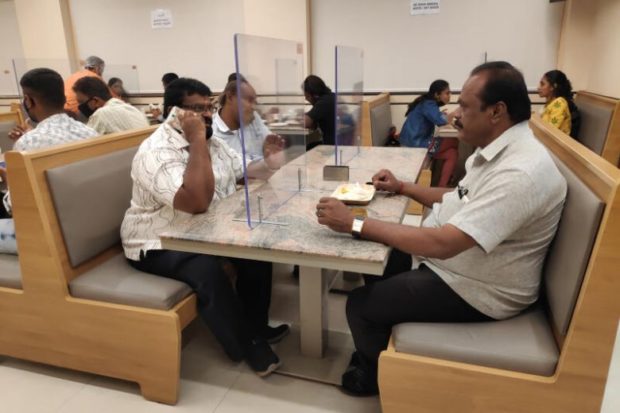Coronavirus: Cautious reopening in some parts of India

A restaurant in Bangalore installed glass partitions that amused its diners The Straits Times/Asia News Network/ROHINI MOHAN
NEW DELHI — Religious institutions, malls and restaurants reopened for business in some parts of India yesterday (Monday), more than two and a half months after they were shut down in March.
The cautious reopening came even as the country recorded nearly 10,000 new coronavirus cases on Sunday, its biggest daily spike since the pandemic hit India. It is now the fifth-hardest hit country in the world with more Covid-19 cases than Italy or Spain.
As of yesterday , it had recorded a total of 256,611 Covid-19 cases with 7,200 deaths.
The southern city of Bangalore was abuzz as restaurants, malls and places of worship were allowed to open. The city corporation and the Karnataka state government issued guidelines for all establishments that reopened, like maintaining social distancing and keeping a record of vendors and delivery agents.
Malls except those in containment zones were open, but only half the shops seemed open in most. Security guards and salespeople welcomed guests with a temperature gun and a bottle of hand sanitizer.
Article continues after this advertisementVehicles entering the building were also being sprayed with sanitizer, but an employee in one mall was unsure if he should spray the whole car and bike or only the tires. “This spray is not to clean mud, it’s for a virus you can’t see,” a supervisor tried to explain to the nervous housekeeping staff.
Article continues after this advertisementBusiness remained lean at malls and shopping centers in Delhi, with only a few stepping out to shop or eat. Major malls in Noida, one of Delhi’s satellite cities, remained shut but most restaurants, including franchises of global chains such as McDonald’s, remained open for delivery and take-away orders only.
But, conscious of the raging pandemic, customers still remain reluctant to eat out. “I am not confident yet to dine out. I need to wait at least another month or so,” said Mr Madhukar Asthana, 54, a businessman.
While some were still sanitizing their establishments before re-opening, others remained uncertain about what best practices they should adopt to ensure safety.
“It think it is going to take another week or so for guests to start coming in,” said Mr Paritosh Chakravarti, 55, whose Noida-based restaurant Aatithyam opened for dine-in customers but had received none until 5 pm yesterday.
However, at a few sit-in restaurants in Bangalore, masked families with children ordered three-course meals but ate them rapidly. The biggest crowds were in south Indian fast food joints where customers stood against tall tables or on pavements. .
Mr Arun Shetty, who manages an outlet of the Taaza Thindi chain, rattled off the new standard operating procedure to prevent infections: encouraging digital transactions, sanitizing all touch points and tables, as well as pushing for takeaways.
“Our migrant waiters went home a month ago. We now have one-third the staff, most of whom live nearby,” said Mr Shetty.
Many restaurants had Covid-19 posters near the cash counter, markings on the floor, no air-conditioning, and no menu cards placed on the tables.
Temples also witnessed the return of some devout worshippers, but people over the age of 60 or under 10 were not being allowed in the five-century-old Bull Temple in south Bangalore.
Head priest Mr Sunil Kumar said the popular temple usually saw more tourists than locals, but the pandemic had changed that. “About 50 locals came this morning. Physical offerings are not allowed,” said Mr Kumar.
The Archdiocese of Bangalore said 110 churches would open only after June 13, after efforts to maintain social distancing are completed. Mosques have removed prayer mats and asked people to conduct ablutions (cleaning ritual) at home.
Some Indian states have decided against reopening.
All religious places, shopping malls, hotels and restaurants will continue to remain closed in the eastern state of Odisha till June 30. West Bengal has also extended its lockdown until the end of this month.
Mizoram, another eastern state, decided to revert to a two-week total lockdown starting June 9 following a sudden spurt in the number of coronavirus cases.
For more news about the novel coronavirus click here.
What you need to know about Coronavirus.
For more information on COVID-19, call the DOH Hotline: (02) 86517800 local 1149/1150.
The Inquirer Foundation supports our healthcare frontliners and is still accepting cash donations to be deposited at Banco de Oro (BDO) current account #007960018860 or donate through PayMaya using this link.